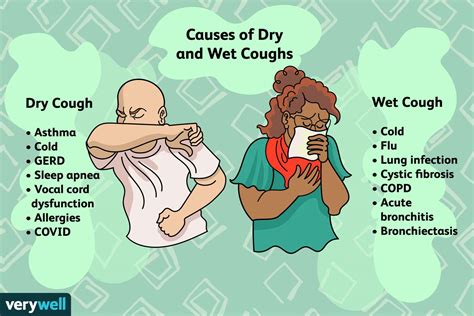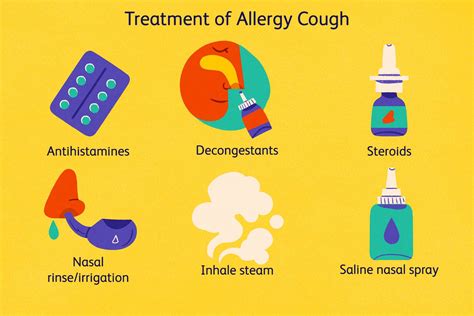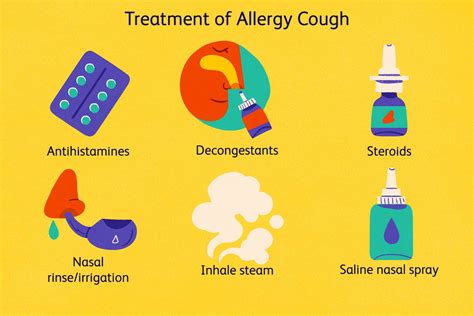Intro
Coughing is a natural reflex that helps to clear the airways of irritants, such as dust, smoke, and mucus. However, a persistent cough can be a symptom of an underlying condition, such as a cold, flu, or allergies. In some cases, a cough can be a sign of a more serious condition, like pneumonia or bronchitis. If you're experiencing a persistent cough, it's essential to identify the underlying cause and seek treatment to alleviate your symptoms and prevent complications.
A cough can be acute or chronic, with acute coughs lasting less than three weeks and chronic coughs lasting more than eight weeks. Acute coughs are often caused by viral infections, such as the common cold or flu, while chronic coughs can be caused by a variety of factors, including allergies, asthma, and gastroesophageal reflux disease (GERD). Understanding the underlying cause of your cough is crucial to finding an effective treatment.
Coughing can be uncomfortable and disrupt daily life, making it challenging to sleep, work, and engage in social activities. In addition to the physical discomfort, a persistent cough can also have emotional and psychological effects, such as anxiety, stress, and embarrassment. If you're experiencing a cough, it's essential to seek medical attention to rule out any underlying conditions that may require medical attention. In this article, we'll explore the causes, symptoms, and treatment options for coughs, as well as provide tips on how to manage and prevent coughing.
Causes of Cough

Types of Cough
Coughs can be classified into different types, including: * Dry cough: a cough that doesn't produce mucus * Wet cough: a cough that produces mucus * Productive cough: a cough that brings up mucus or phlegm * Non-productive cough: a cough that doesn't bring up mucus or phlegm Understanding the type of cough you have can help you identify the underlying cause and find an effective treatment.Symptoms of Cough

Diagnosing Cough
To diagnose the underlying cause of a cough, your doctor may perform a physical examination, take a medical history, and order diagnostic tests, such as: * Chest X-ray * Computed tomography (CT) scan * Pulmonary function tests (PFTs) * Blood tests * Sputum testsTreatment Options for Cough

Home Remedies for Cough
There are many home remedies that can help to alleviate cough symptoms, including: * Drinking plenty of fluids, such as water or tea * Using a humidifier to add moisture to the air * Sucking on lozenges or cough drops * Gargling with salt water * Trying throat-soothing teas, such as slippery elm or marshmallow rootPreventing Cough

Cough in Children
Coughing in children can be a concern for parents, as it can be a symptom of a underlying condition, such as croup or pneumonia. If your child is experiencing a persistent cough, it's essential to seek medical attention to rule out any underlying conditions that may require medical attention.Cough in Adults

When to Seek Medical Attention
If you're experiencing a persistent cough, it's essential to seek medical attention if you experience any of the following symptoms: * Difficulty breathing or shortness of breath * Chest pain or tightness * Coughing up blood or yellow or green mucus * Fever or chills * Headaches or facial painWhat is the most common cause of cough?
+The most common cause of cough is a viral infection, such as the common cold or flu.
How can I prevent coughing?
+You can prevent coughing by practicing good hygiene, avoiding close contact with people who are sick, getting plenty of rest and managing stress, quitting smoking or avoiding secondhand smoke, and avoiding allergens.
What are some home remedies for cough?
+Some home remedies for cough include drinking plenty of fluids, using a humidifier, sucking on lozenges or cough drops, gargling with salt water, and trying throat-soothing teas.
If you're experiencing a persistent cough, it's essential to seek medical attention to rule out any underlying conditions that may require medical attention. In the meantime, you can try some home remedies to alleviate your symptoms, such as drinking plenty of fluids, using a humidifier, and trying throat-soothing teas. Remember to practice good hygiene, avoid close contact with people who are sick, and get plenty of rest and manage stress to prevent coughing. We hope this article has provided you with helpful information on how to cure a cough. Please share your thoughts and experiences in the comments below, and don't forget to share this article with your friends and family to help them stay healthy and happy.
